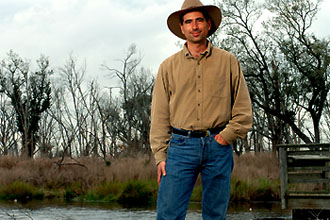Barataria Bay Beckons Coastal Scientists
Beyond the immediate BP oil disaster, the long-term history of impacts to Louisiana's coastal zone is “turning out to be the more important story,” says Alex Kolker, an adjunct professor and research scientist in the Tulane Department of Earth and Environmental Sciences. This history includes previous oil spills, natural hydrocarbon seeps and a landscape that loses nearly 24 square miles of land every year.

“There's still a lot of work we need to do,” says research scientist Alex Kolker, whose work involves documenting the regrowth of plants in marshes damaged by the oil spill. (Photo by Paula Burch-Celentano)
Kolker is involved in a National Sciences Foundationâ“funded research project in which he and colleagues from Texas A&M University, Louisiana State University and Georgia Tech are collecting data on dissolved organic carbon in the bay waters.
Dissolved organic carbon leaches into water the same way that tea does when it is steeped, says Kolker. “Whatever kind of tea you have in a tea bag is reflected in the flavor of the water.” This makes dissolved organic carbon a good indicator of an ecosystem's general health. The team is collecting water samples and looking for “oil signatures” at sites heavily impacted by the BP oil spill and locations that were not significantly affected.
Kolker also is working on research with Mike Blum, an assistant professor in the Department of Ecology and Evolutionary Biology at Tulane, and scientists from Los Alamos National Laboratory to study the genetics of microbial communities impacted by the spill. Microbial communities play an important role in the food web of estuaries, and changes in these communities can act as a harbinger of broader environmental changes.
In another spill-related project, Kolker is photo-documenting the regrowth of plants on damaged marshes. “We've actually been able to see it,” says Kolker. “We can see marshes regrowing in areas that were hit heavily by oil.”
While the regrowth of marsh grass is an encouraging sign, Kolker says that the long-term effects of the oil spill are unknown. “We don't know what's going on in terms of wetland loss and how this will translate into wetland loss throughout the whole year. There's still a lot of work we need to do.”
